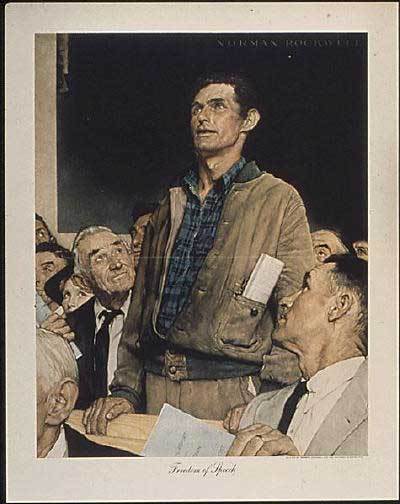With the help of the Laudator (definitely check his post!):

| The Four Freedoms |
| Freedom of Speech |
| Freedom of Worship |
| Freedom From Fear |
| Freedom From Want |
In Rome you can see the rebuilt Senate in the Roman Forum. It was rebuilt by Julius Caesar because the old Senate burned down. One of Caesar’s thugs, P. Clodius killed one of Pompey’s thugs, Milo, south of Rome on the road at an inn. The rest is history….
In 53 BC Milo was up to be consul. P. Clodius was for Praetor. Each had armed bands which clashed constantly. One day, seemingly by chance – though it may have been orchestrated by ACORN – Milo and Clodius with their armed thugs met Appian Way near Bovillae near Rome. Don’t be shocked, but a fight broke out. Clodius died. Clodius’ adherents freaked out, hauled his body to the Roman Forum, busted into the Senate, dragged out the wooden furniture, and burned his body. The Senate caught and burned down. Caesar would eventually rebuild the Senate.
Think of the town hall meetings now….
Cicero, Letters to his brother Quintus, 2.3.2 (56 B.C., tr. D.R. Shackleton Bailey):
Milo appeared on 7 February. Pompey spoke—or rather tried to speak, for no longer was he on his feet than Clodius’ gang raised a clamour, and all through the speech he was interrupted not merely by shouting but by booing and abuse. When he wound up (and I will say he showed courage; he was not put off, delivered all he had to say, sometimes even managing to get silence by his personal authority)—well, when he wound up, Clodius rose. Wishing to repay the compliment, our side gave him such an uproarious reception that he lost command of thoughts, tongue, and countenance. That lasted till half past one, Pompey having finished just after midday—all manner of insults, ending up with some highly scabrous verse to the address of Clodius and Clodia. Pale with fury, he started a game of question and answer in the middle of the shouting: ‘Who’s starving the people to death?’ ‘Pompey,’ answered the gang. ‘Who wants to go to Alexandria?’ Answer: ‘Pompey.’ ‘Whom do you want to go?’ Answer: ‘Crassus’ (who was present as a supporter of Milo, wishing him no good). About 2:15 the Clodians started spitting at us, as though on a signal. Sharp rise in temperature! They made a push to dislodge us, our side countercharged. Flight of gang. Clodius was hurled from the Rostra, at which point I too made off for fear of what might happen in the free-for-all.


































I may be thinking of the wrong eastern expedition, but, on this occasion, didn’t M. Crassus’ foray to the east turn out rather poorly for him?
You mean other than getting killed and having his own skull turned into a drinking vessel?
No. Other than that the trip was great!
Most of the American Founders were graduates of the colonial “Big Eight.” Like their British counterparts, they had studied Cicero (known to Cotton Mather, of an earlier generation, as ‘Tully’), Caesar (Gallic and Civil Wars), and other authors who chronicled the end of the Republic. This path of study was required to enter and to stay at the major schools. It appears this part of study informed the Founders when they went to work on the new Republic.
My understanding is that some of the debates over slavery in Congress just prior to the U.S. Civil War resulted in violence in the Senate. Senator Charles Sumner, a northern senator, was beaten by southern Congressman Preston Brooks on May 22nd 1856, using a gold tipped cane. Sumner was pretty badly injured
Historical perspective helps.
As we say in Quebec, “plus ca change, plus c’est la meme chose”! (Sorry, my keyboard isn’t bilingual)
Old M. T. is snappy rather than elegant: “…exarsit dolor…ac nos quoque tum fugimus, ne quid in turba.” A modern rendition: “…a bad mood got hotter…we then fled, not knowing what the crowd might do.” He still uses fewer words then English.
Remember, many Romans welcomed Octavian’s rule after nearly 100 years of disruption.
Salutationes omnibus.
Thing were not all that calm at the Council of Nicea, either. St. Nicholas (our Santa Claus) became so upset with a supporter of Arius that he thwacked him with his cane.
For those that read the Laudator link, and the August 6th Times Krugman excerpt therein, I have a question:
“…shows an ordinary citizen expressing an unpopular opinion. His neighbors obviously don’t like what he’s saying, but they’re letting him speak his mind.”
The Four Freedoms have long been among my favorite Rockwell pieces. I’ve never had the impression the standing man had an “unpopular opinion” or that the others “obviously don’t like what he’s saying”. I’ve done a little reading-up on it, and haven’t found anything to suggest such was Rockwell’s intent. I don’t see how Krugman can claim that from the faces portrayed. Some are looking at the speaker, some not. Some are listening, some not. Some may disagree, some may not.
Is it just me? Have I missed something so “obvious” all these years? Or is this Krugman fellow projecting his feelings about the health care debate?
Anybody have any background information or strong feelings about it?
Coincidence…I just visited the Norman Rockwell museum in Stockbridge, Mass. yesterday and saw the originals of these!